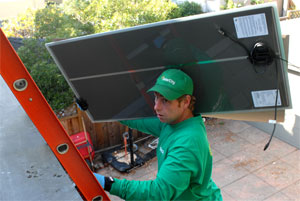Guest post today from our friend Dan Auld who is a San Diego writer whose stories about solar at Wal-Mart and Google and other alternative energy sources. This article points out some interesting stuff about the issues that the solar installation business needs to be aware of in order to survive these hard economic times. Not sure if Rush should get the credit so much as his advertisers who bought time on his show but it is a good hook. Thanks Dan.
by Dan Auld
November 4, 2011
Will Rush Limbaugh save the solar industry?

Like lots of other solar installers, the financial tsunami of 2008 wiped out a lot of customers of both Lynch and Basho. And like a lot of other electrical contractors, through no fault of their own, they not only lost business, they lost their credit.
“When you see people on TV talking about green jobs or any kind of jobs, here’s what they usually do not know: That small contractors need a bond,” said Lynch. “And a bond is really a line of credit. And a lot of contractors just don’t have the cash or the credit score to do that any more because of the crash of 2008.”
So they lose work, especially government work where bonds are required. And most people do not know that, Lynch said.
“I was bidding on a solar installation job, part of the stimulus program, and I knew I needed a bond,” Lynch said. “Seven companies turned me down. I had just about given up when I was driving around listening to Rush Limbaugh. The commercial talked about how contractors could not get bonds anymore, but this company could do it.”
“I told my wife wouldn’t that be good if they were telling the truth. They were.”
Sprio Basho had a similar experience in New York. This electrical contractor lost a lot of work in 2008, but he did what he had to to hold on.
“I might have been listening to the same commercial because I had the same problem,” Basho said. “I had been in business a long time. Did good work. But all of a sudden the bonding disappeared. I thought my business was going to disappear too because we were counting on installing solar to stay alive.”
And they did. Both of them. As a result, Basho’s company won a contract installing solar panels in a school district; and Lynch’s company was awarded a $1.8 million contract for several solar installations in Pennsylvania and New Jersey.
All because of Rush. And because of what happened at Robert Berman’s kitchen table when he was a teenager.
“I listened to an insurance broker tell my dad he could not accept a bigger job because he did not qualify for a bond,” said Robert Berman, co-founder of Ox Bonding. “My dad was a building contractor who did great work and had great references, but that was not enough for that insurance company.That’s why I started a bonding company for small contractors: There are a lot of good companies out there that do good work, with good records, and their customers love them. So we write their bonds and make sure they get working capital too.”
Berman is not running a non-profit agency. He knows his company takes a risk every time it provides working capital. Every time it writes a bond for a contractor.
(For the non-initiated, a bond guarantees the contractor will finish the job and pay the subcontractors. If not, the job owner gets relief from the bonding company, which in turn can try to get its money back from the contractor.)
“That’s why we look under the hood, check the books, call the customers, and really take a hard look if the company can do the job,” Berman said. “Our underwriters are experienced contractors, not just accountants. So they have a good idea of who is able to do what, and what the risk really is.”
To reduce its risk even further, Ox Bonding controls the distribution of funds for the job.
And if the contractor chooses, Ox Bonding can also issue working capital, pay the taxes, take care of payroll, negotiate with suppliers, and free up the contractors for what they really want to do: Build solar installations.
“They are more of a partner than a bonding company,” said Bashos. “But without them, I would not have been able to survive.”
What are your thoughts about this article? Well don’t sit on your hands, leave us a comment below and share your thoughts. Oh and do Dan a favor and hit some of our social bookmark pages below too as it will help get him some more eyeballs.